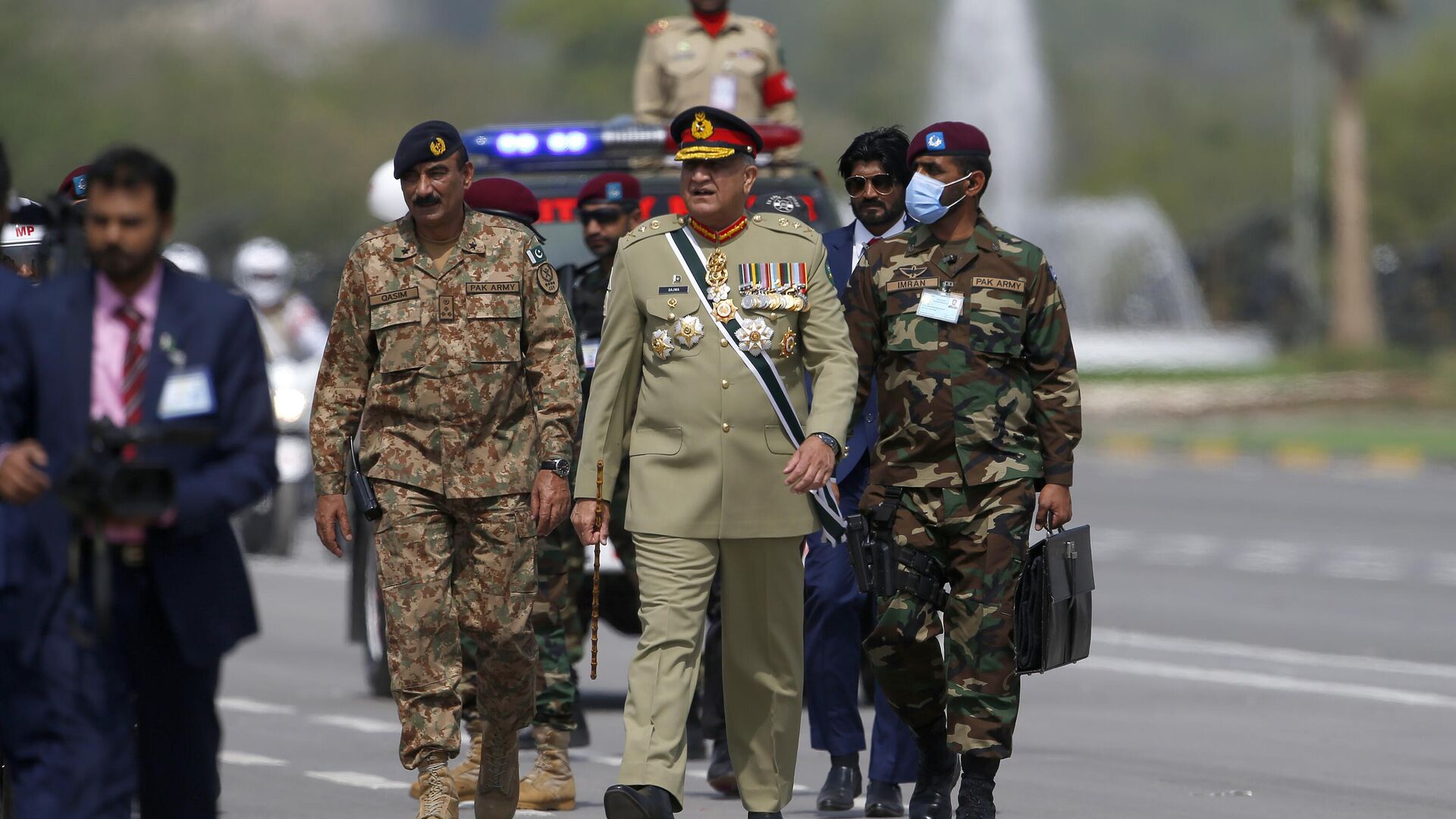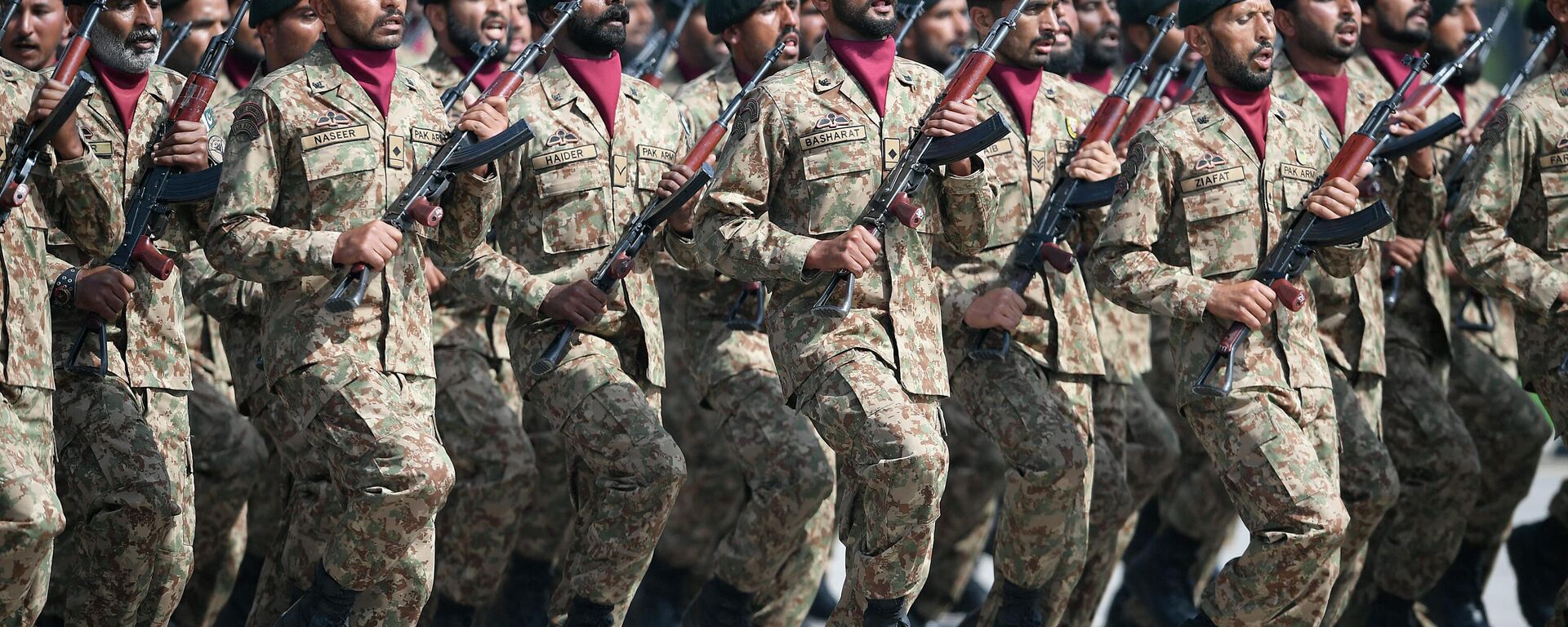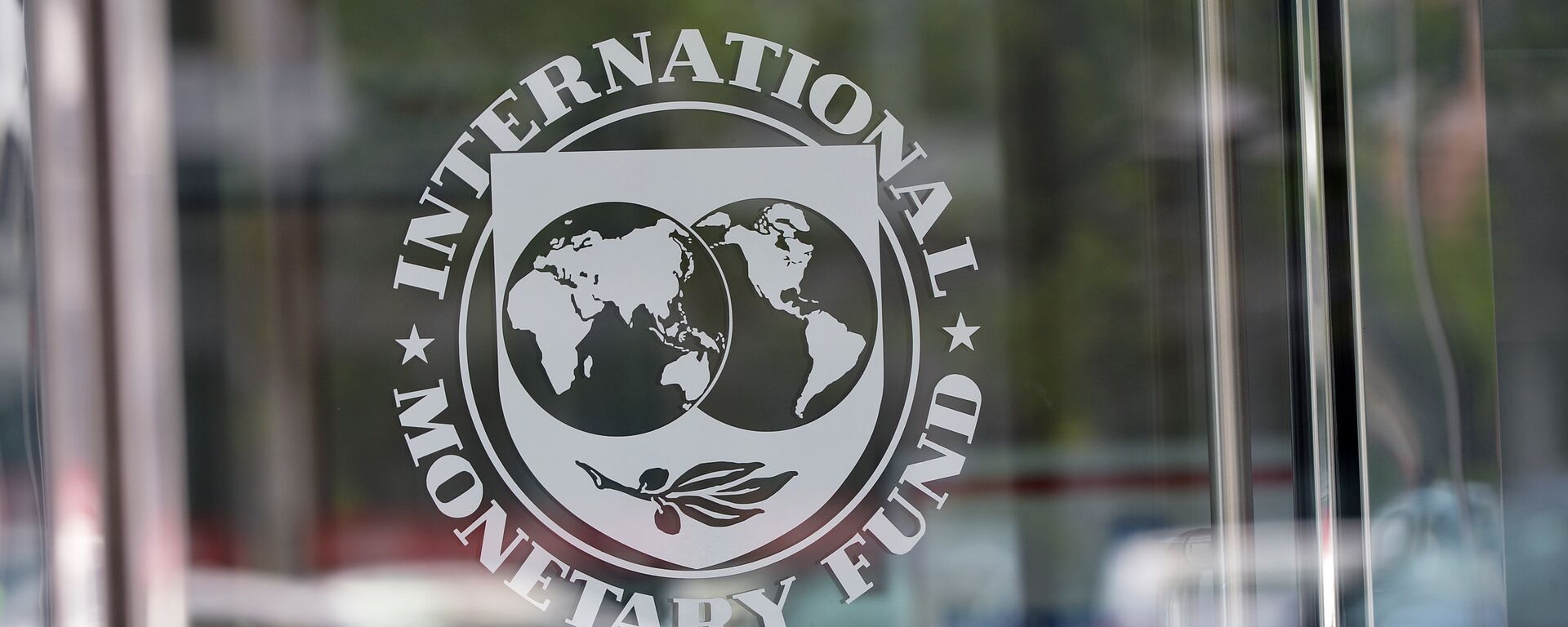https://sputnikglobe.com/20221116/who-will-be-pakistans-next-army-chief-1104261592.html
Who Will Be Pakistan's Next Army Chief?
Who Will Be Pakistan's Next Army Chief?
Sputnik International
Pakistan's prime minister will soon be announcing a new Chief of Army Staff (COAS), one of the most powerful positions in the country. The outgoing COAS... 16.11.2022, Sputnik International
2022-11-16T06:36+0000
2022-11-16T06:36+0000
2022-12-10T11:39+0000
world
army
general
defense
pakistani armed forces
pakistan
politics
https://cdn1.img.sputnikglobe.com/img/07e6/04/02/1094425469_0:160:3072:1888_1920x0_80_0_0_1aefdd0f3614dc8934a1117e06790ea2.jpg
The Pakistan Army, like Pakistan, was formed on August 14, 1947 amid the partition of the Indian subcontinent. Since independence, Pakistan's army, like its navy and air force, has grown into a highly-motivated and modern force which stands to guard and protect the ideological and geographical frontiers of Pakistan.It is the world's sixth-largest army measured by active military personnel. It consists of three formally uniformed services - the Army, Navy, and the Air Force, which are backed by a number of constitutionally sanctioned paramilitary forces.In terms of its power, Pakistan's armed forces are ranked as the 9th most powerful in the world, according to Global Firepower.The army has a critical component to its structure - the Strategic Plans Division Forces, which safeguards and maintains Pakistan's tactical and strategic nuclear weapons stockpile and assets. It is estimated that Pakistan now has a nuclear weapons stockpile of approximately 165 warheads.The large number of military personnel (the total number of active-duty troops stands at 560,000, and there are 550,000 reservists) makes Pakistan's army a formidable force.Within the country, approximately 60–70% of the military personnel are stationed along the Indo-Pakistani border. Following the US invasion of Afghanistan, more than 150,000 were deployed towards the Tribal Areas of the country, adjacent to Afghanistan. Also since 2004, Pakistan's armed forces have been actively engaged in military efforts against al-Qaeda* terrorists in order to maintain peace within the country, following the deadly terrorist attacks in Peshawar, Karachi and Lahore back in the 2010s.Considering all of the above factors, it is no wonder that the leadership of the Pakistan Armed Forces is deemed as one of the most important and prestigious positions in the country.The Chief of Army StaffAt present all the political candidates, analysts, journalists and general public in Pakistan are awaiting the appointment of the new Chief of Army Staff, as the current General Qamar Javed Bajwa nears the completion of his extended tenure at the end of November.General Bajwa has been Chief of Army Staff (COAS) since November 29, 2016. The Chief of Army Staff is based in the Army General Headquarters (GHQ), situated in the city of Rawalpindi.The COAS is the most senior officer in the Pakistan Army. According to Article 243 (3) of Pakistan's Constitution, the president would appoint the COAS on the recommendation of the prime minister. The term length is for three years and can be renewed once.In terms of the process of selection, traditionally General Headquarters (GHQ) sends a list of candidates - four to five senior-most lieutenant-generals, along with their files, to the Ministry of Defence, which then forwards them to the prime minister to select the officer he finds best suited to the role.The prime minister allegedly makes this decision after holding consultation and private meetings with the outgoing army chief, conducting discussions with his closest aides and advisors and also based on his own preference.Who is Likely to be Considered for the Top Army Post?The formal announcement is likely to be made only a few days before the change of command but the following candidates are the top six generals after General Bajwa.Lieutenant General Asim MunirLt-Gen Asim Munir has allegedly been a close ally of General Bajwa since he commanded troops in the Force Command Northern Areas as a brigadier under the incumbent COAS, who was at the time Commander X Corps.Munir was later made DG Military Intelligence in early 2017, and in October 2018 he became the Inter-Services Intelligence (ISI) chief. However, after just eight months, he was replaced by Lt-Gen Faiz Hamid, and was posted as Gujranwala Corps commander, a position he held for two years before being moved to the GHQ as Quartermaster General.Lieutenant General Sahir Shamshad MirzaLt-Gen Mirza had an impressive career in the army, particularly in senior leadership positions as he served as director-general military operations (DGMO) and ran crucial military operations against Tehreek-i-Taliban Pakistan (TTP) and other militants in North Waziristan.Earlier, he was appointed Chief of General Staff (CGS), which made him the second-most powerful person in the army after the COAS. In that capacity, Mirza was involved in decision-making related to national security and foreign affairs.In October 2021, he was posted as Corps Commander Rawalpindi, which allowed him to acquire operational experience and become eligible to be considered for the top posts.Lieutenant General Azhar AbbasAt present, Lt-Gen Azhar Abbas is the Chief of General Staff (CGS), which means that he is directly running the army in both operational and intelligence directorates at GHQ.He is known to be the most experienced in Indian affairs and has commanded the 12th Infantry Division based in Murree, from where he was in charge of Azad Jammu & Kashmir.Lieutenant General Nauman MehmoodLt-Gen Mehmood is currently president of the National Defence University and he belongs to the Baloch regiment. After he was promoted to a three-star general, Lt-Gen Mehmood was appointed Inspector-General of Communications & Information Technology at the GHQ in 2019.He has extensive experience in commanding an infantry division based in North Waziristan. He was also posted as Director-General (Analysis) at the ISI, dealing in foreign policy analysis from a national security angle.Lieutenant General Faiz HamidGen Bajwa and Lt-Gen Hamid have reportedly known each other for a long time and Gen Bajwa posted Hamid as Director-General (Counter-Intelligence) at ISI, where he was in charge of internal security and political affairs.Later on he was promoted and appointed as Director General of the ISI.Lieutenant General Mohammad AmirLt-Gen Amir is at present commanding the XXX Corps in Gujranwala. Previously he had also served as Director-General Staff Duties at the COAS Secretariat, which enabled him to gain insight into the GHQ and senior command positions.In 2011-2013 Amir served as a military secretary to then President Asif Zardari.*al-Qaeda is a terrorist organization banned in Russia and many other statesThe views and opinions expressed in this column are those of the author and do not necessarily reflect the position of Sputnik.
https://sputnikglobe.com/20220414/pakistan-army-claims-it-backed-imran-khans-visit-to-russia-1094761856.html
https://sputnikglobe.com/20220805/after-us-pakistans-army-chief-seeks-help-from-uae-saudi-arabia-over-imf-loan-deal-1098166525.html
pakistan
Sputnik International
feedback@sputniknews.com
+74956456601
MIA „Rossiya Segodnya“
2022
Aneela Rashid
https://cdn1.img.sputnikglobe.com/img/07e6/09/0e/1100768477_0:338:606:944_100x100_80_0_0_af078d1bbaf1e33c21f16169e9ed7a5f.jpg
Aneela Rashid
https://cdn1.img.sputnikglobe.com/img/07e6/09/0e/1100768477_0:338:606:944_100x100_80_0_0_af078d1bbaf1e33c21f16169e9ed7a5f.jpg
News
en_EN
Sputnik International
feedback@sputniknews.com
+74956456601
MIA „Rossiya Segodnya“
Sputnik International
feedback@sputniknews.com
+74956456601
MIA „Rossiya Segodnya“
Aneela Rashid
https://cdn1.img.sputnikglobe.com/img/07e6/09/0e/1100768477_0:338:606:944_100x100_80_0_0_af078d1bbaf1e33c21f16169e9ed7a5f.jpg
army, general, defense, pakistani armed forces, pakistan, politics
army, general, defense, pakistani armed forces, pakistan, politics
Who Will Be Pakistan's Next Army Chief?
06:36 GMT 16.11.2022 (Updated: 11:39 GMT 10.12.2022) Pakistan's prime minister will soon be announcing a new Chief of Army Staff (COAS), one of the most powerful positions in the country. The outgoing COAS, General Qamar Javed Bajwa, would be stepping down at the end of his extended tenure in the last week of November.
The Pakistan Army, like Pakistan, was formed on August 14, 1947 amid the partition of the Indian subcontinent. Since independence, Pakistan's army, like its navy and air force, has grown into a highly-motivated and modern force which stands to guard and protect the ideological and geographical frontiers of Pakistan.
It is the world's sixth-largest army measured by active military personnel. It consists of three formally uniformed services - the Army, Navy, and the Air Force, which are backed by a number of constitutionally sanctioned paramilitary forces.
In terms of its power, Pakistan's armed forces are ranked as the 9th most powerful in the world, according to Global Firepower.
The army has a critical component to its structure - the Strategic Plans Division Forces, which safeguards and maintains Pakistan's tactical and strategic nuclear weapons stockpile and assets. It is estimated that Pakistan now has a nuclear weapons stockpile of approximately 165 warheads.
One report suggests that "with several new delivery systems in development, four plutonium production reactors, and an expanding uranium enrichment infrastructure, however, Pakistan’s stockpile has the potential to increase further over the next 10 years."
The large number of military personnel (the total number of active-duty troops stands at 560,000, and there are 550,000 reservists) makes Pakistan's army a formidable force.
Within the country, approximately 60–70% of the military personnel are stationed along the Indo-Pakistani border. Following the US invasion of Afghanistan, more than 150,000 were deployed towards the Tribal Areas of the country, adjacent to Afghanistan. Also since 2004, Pakistan's armed forces have been actively engaged in military efforts against al-Qaeda* terrorists in order to maintain peace within the country, following the deadly terrorist attacks in Peshawar, Karachi and Lahore back in the 2010s.
Considering all of the above factors, it is no wonder that the leadership of the Pakistan Armed Forces is deemed as one of the most important and prestigious positions in the country.
At present all the political candidates, analysts, journalists and general public in Pakistan are awaiting the appointment of the new Chief of Army Staff, as the current General Qamar Javed Bajwa nears the completion of his extended tenure at the end of November.
General Bajwa has been Chief of Army Staff (COAS) since November 29, 2016. The Chief of Army Staff is based in the Army General Headquarters (GHQ), situated in the city of Rawalpindi.
The COAS is the most senior officer in the Pakistan Army. According to Article 243 (3) of Pakistan's Constitution, the president would appoint the COAS on the recommendation of the prime minister. The term length is for three years and can be renewed once.
In terms of the process of selection, traditionally General Headquarters (GHQ) sends a list of candidates - four to five senior-most lieutenant-generals, along with their files, to the Ministry of Defence, which then forwards them to the prime minister to select the officer he finds best suited to the role.
The prime minister allegedly makes this decision after holding consultation and private meetings with the outgoing army chief, conducting discussions with his closest aides and advisors and also based on his own preference.
Who is Likely to be Considered for the Top Army Post?
The formal announcement is likely to be made only a few days before the change of command but the following candidates are the top six generals after General Bajwa.
Lieutenant General Asim Munir
Lt-Gen Asim Munir has allegedly been a close ally of General Bajwa since he commanded troops in the Force Command Northern Areas as a brigadier under the incumbent COAS, who was at the time Commander X Corps.
Munir was later made DG Military Intelligence in early 2017, and in October 2018 he became the Inter-Services Intelligence (ISI) chief. However, after just eight months, he was replaced by Lt-Gen Faiz Hamid, and was posted as Gujranwala Corps commander, a position he held for two years before being moved to the GHQ as Quartermaster General.
Lieutenant General Sahir Shamshad Mirza
Lt-Gen Mirza had an impressive career in the army, particularly in senior leadership positions as he served as director-general military operations (DGMO) and ran crucial military operations against Tehreek-i-Taliban Pakistan (TTP) and other militants in North Waziristan.
Earlier, he was appointed Chief of General Staff (CGS), which made him the second-most powerful person in the army after the COAS. In that capacity, Mirza was involved in decision-making related to national security and foreign affairs.
In October 2021, he was posted as Corps Commander Rawalpindi, which allowed him to acquire operational experience and become eligible to be considered for the top posts.
Lieutenant General Azhar Abbas
At present, Lt-Gen Azhar Abbas is the Chief of General Staff (CGS), which means that he is directly running the army in both operational and intelligence directorates at GHQ.
He is known to be the most experienced in Indian affairs and has commanded the 12th Infantry Division based in Murree, from where he was in charge of Azad Jammu & Kashmir.
Lieutenant General Nauman Mehmood
Lt-Gen Mehmood is currently president of the National Defence University and he belongs to the Baloch regiment. After he was promoted to a three-star general, Lt-Gen Mehmood was appointed Inspector-General of Communications & Information Technology at the GHQ in 2019.
He has extensive experience in commanding an infantry division based in North Waziristan. He was also posted as Director-General (Analysis) at the ISI, dealing in foreign policy analysis from a national security angle.
Lieutenant General Faiz Hamid
Gen Bajwa and Lt-Gen Hamid have reportedly known each other for a long time and Gen Bajwa posted Hamid as Director-General (Counter-Intelligence) at ISI, where he was in charge of internal security and political affairs.
Later on he was promoted and appointed as Director General of the ISI.
Lieutenant General Mohammad Amir
Lt-Gen Amir is at present commanding the XXX Corps in Gujranwala. Previously he had also served as Director-General Staff Duties at the COAS Secretariat, which enabled him to gain insight into the GHQ and senior command positions.
In 2011-2013 Amir served as a military secretary to then President Asif Zardari.
*al-Qaeda is a terrorist organization banned in Russia and many other states
The views and opinions expressed in this column are those of the author and do not necessarily reflect the position of Sputnik.





